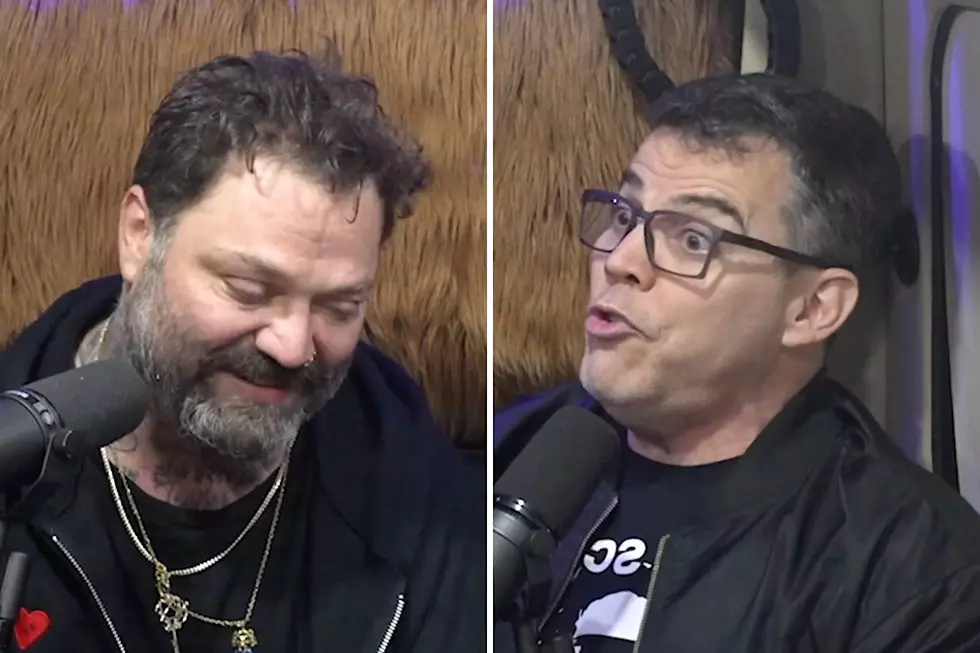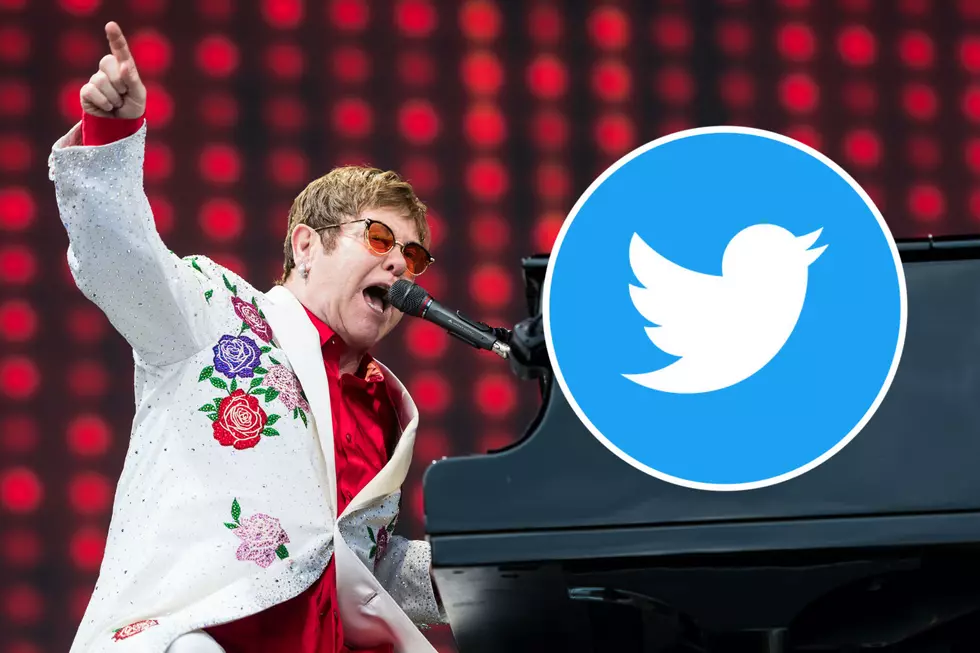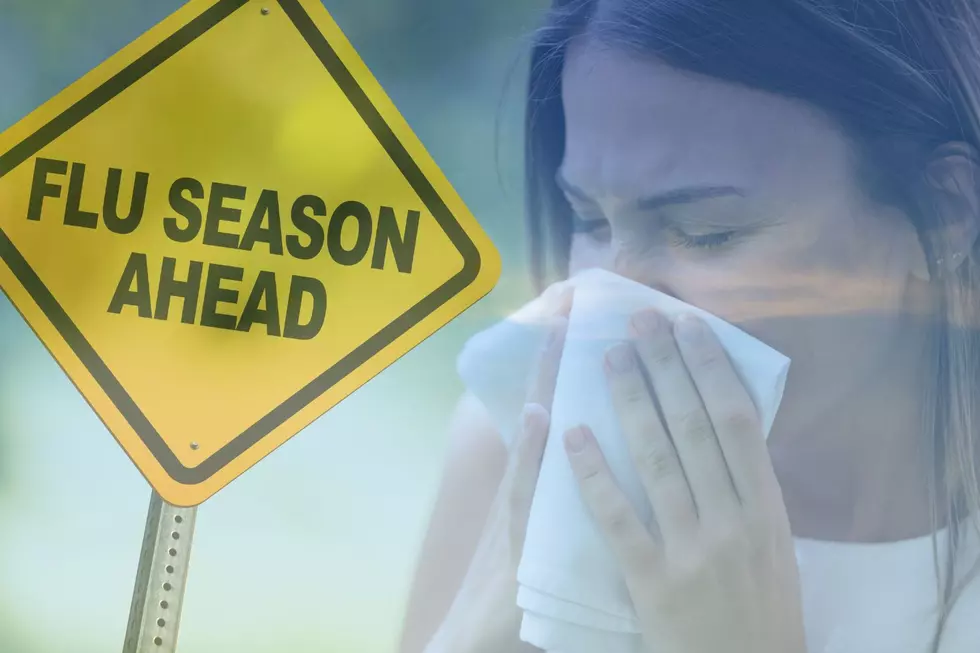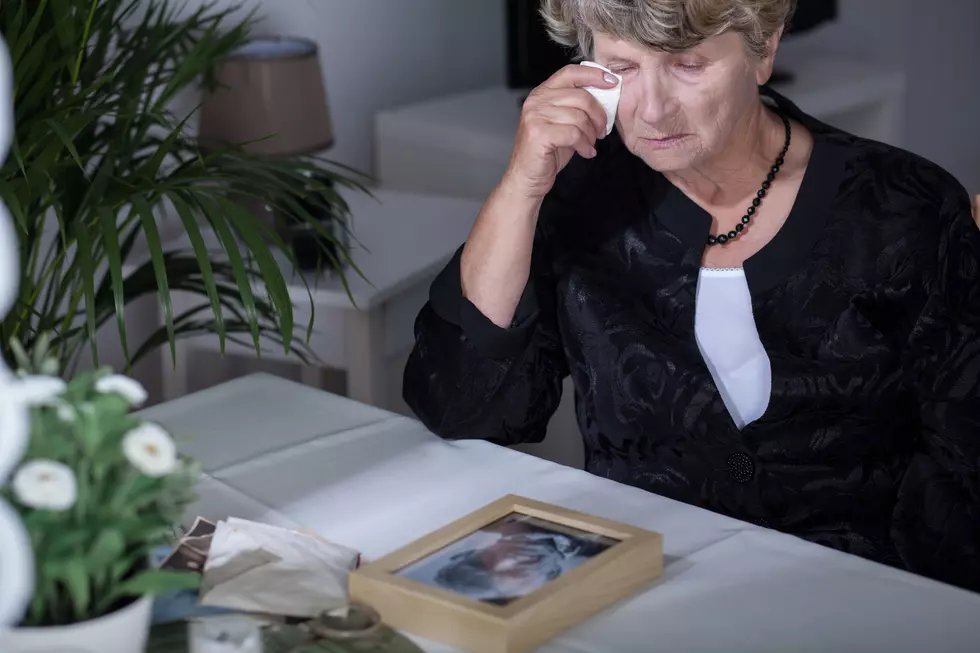
Cheyenne Nurse Describes Life in a Wyoming COVID Unit
As the coronavirus pandemic rages on, the lives and jobs of our health care professionals continue to be challenging. The staff at our hospitals in Wyoming are fighting a valiant fight, but it is a draining and frustrating struggle.
Not only is the struggle against a new disease that is moving through the population. But, the struggle against misinformation and exhaustion. COVID-19 has pushed our health care professionals to the edge. These necessary and dedicated members of our communities give their all, often without reward.

One nurse who works in the COVID unit at Cheyenne Regional Medical Center recently told her story. Briana "Breezi" Iverson took people inside her day as a caretaker of the people struck hardest by the virus.
Iverson starts her day early, often before the sun rises. She kisses her son's forehead before heading to CRMC for a 13-hour shift. She'll often work four of those shifts a week. "That could mean 4-6 days straight with only 1-3 days off in between," she said.
We have been lucky to have some amazing travel nurses coming to the front lines to help fight what feels like a losing battle. We also have our own astounding nurses, CNAs, pharmacists, phlebotomists, therapists, dietitians, housekeepers, doctors, social workers, kitchen staff, chaplains, and so many more who continue to show up. Those who have stayed since the start and those that are new, sacrificing time at home with their loved ones. I couldn’t be more grateful for such brave souls. I am proud to walk along side them, cry and laugh with them, lift them up when they fall as they lift me up. They really are my work-family that I’m blessed to have during such a difficult time.
After her time in the COVID Unit, Iverson says a run and family time help her decompress before the next tour in the hospital. "I try to pick up with my family where I missed and left off and re-attend the adult responsibilities waiting for my attention," she said, "I try to forget about the chaos I came from hours ago, but it’s hard."
Iverson is a six-year nursing veteran and has been on the front lines of COVID in Cheyenne since the beginning. "Nursing is so much more than just giving medications," she said, "True nursing is finding the light on their darkest days, the ugliest days." She adds, "Nurses deal with death all the time, we choose our jobs, and I love mine, but this is different."
These ugly days are wearing on our community's health care professionals, and Iverson wants to let Wyoming know that the, "...world’s perception of Covid doesn’t match what I know to be inside the very walls of the hospital that I show up to every day fighting with sweat, tears, and exhaustion."
"It is so real and it is so ugly. It needs to be voiced, so I will be the voice of many," Iverson said, "We are tired of struggling to keep our heads above water with no end in sight. These are the facts I can’t make up."
Here is Briana "Breezi" Iverson's full Wyoming COVID unit experience, in her own words:
A Painted Picture: A Nurse’s Covid Story - August 30, 2021
With a heavy heart, I kiss my son’s forehead as I leave for work before the sun rises. Just a few more moments of silence to myself before I apply my mask and exit my vehicle where I make my way up to my floor, the Covid floor. I take one last deep breath as I look in the mirror before I walk out of the break room to start my shift. I’ll finish a long day after about 13 hours and if I haven’t missed the sunset, I might go for a much needed run. I’ll help put my child to bed, read him a book, kiss him good night, and then get ready for my next shift.
A shift that might be my overtime shift for that week. That’s 4 shifts a week instead of the standard 3. That could mean 4-6 days straight with only 1-3 days off in between. We often scramble for travel nurses if there are any. We have been lucky to have some amazing travel nurses coming to the front lines to help fight what feels like a losing battle. We also have our own astounding nurses, CNAs, pharmacists, phlebotomists, therapists, dietitians, housekeepers, doctors, social workers, kitchen staff, chaplains, and so many more who continue to show up. Those who have stayed since the start and those that are new, sacrificing time at home with their loved ones. I couldn’t be more grateful for such brave souls. I am proud to walk along side them, cry and laugh with them, lift them up when they fall as they lift me up. They really are my work-family that I’m blessed to have during such a difficult time.
“My name is Breezi, like it’s breezy outside, but at least I’m not windy,” as I introduce myself to a new face. I usually get a smile or chuckle as Cheyenne is known for its wind. I have been a nurse for almost 6 years, including 3 and a half of those years at Cheyenne Regional Medical Center as a medical nurse on the 7th floor. In August 2020, my floor became the Covid floor, which was hard to process and still is. That was the first time Cheyenne saw the worst of Covid, just in time for the holidays. Many nurses were scared, including myself. We didn’t know what to expect. We lost a lot of nurses whom I cannot blame for leaving as we all have our own reasons for staying or leaving. For the majority of last year we have continued to remain in overtime. At one point we had the National Guard show up to help us when Covid was at its worst. I have met so many beautiful and unique individuals that remind me there are still good, selfless people in this world. There were many times I too wanted to leave and it still crosses my mind from time to time. Ultimately, I don’t have the heart to leave my team and my community in the middle of a pandemic because I love my job to my core and I can feel the difference that I make. I know I mean a lot to those alone and afraid in the hospital hoping someone will show up, so I show up. An obligation I’m proud to show up for every day and a struggle I’m willing to continue to endure.
These are shifts I hang up at the door when I leave. After hanging them up I try to pick up with my family where I missed and left off and re-attend the adult responsibilities waiting for my attention. I try to forget about the chaos I came from hours ago, but it’s hard.
What’s hard is that picture inside of that bag that’s hung at the door. The picture that illustrates the burden we carry as a result of this pandemic, the result of our depression, the heartaches we never talk about in a pandemic that are different from any other diseases we have ever dealt with. A pandemic that is almost 2 years in with no end in sight that only offers fear and uncertainty. A picture that no one gets to see. A picture we want everyone to see. We want to show the world because it’s so hard to hang up that bag and return to a world that is blind to that picture, when the world’s perception of Covid doesn’t match what I know to be inside the very walls of the hospital that I show up to every day fighting with sweat, tears, and exhaustion. The real life human beings I’ve watched suffer. Only adding weight to the bag that I hang, as my bag is getting quite heavy. It creates an indescribable burden that weighs the medical field down because it’s hard to live in a pandemic that is ripping our community, nation, and world apart in so many different ways when more than anything right now we need to come together. So let me illustrate.
My picture looks something like this.
Our ICU is full of people I’ve gotten to know and meet…people I have sent to the ICU from the Covid unit where I work, people who I’ve updated families members about every day (before they were sent to the ICU) about how they’re doing. I’ve been honored to help treat and care for many 30- to 90-year-old moms, dads, grandmas, grandpas, aunts, uncles, sisters, brothers, nieces, nephews, neighbors, friends, and cousins. I sit with them, wearing PPE and an N95 for hours. I make time to sit with them and find out who they are outside of being a patient. Like their spouses, littles, and animals at home who they FaceTime for some kind of normalcy, hoping to see them again because the only people they get to see is us, in yellow suits and masks for moments at a time. I tape a picture of me and my son to my shield so my patients can see who I am. I am more than just a yellow, masked-up, gowned-up stranger.
Nursing is so much more than just giving medications. True nursing is finding the light on their darkest days, the ugliest days. It truly is the little things that matter more than anything else I do as a nurse. I make it a point to find ways to make them more comfortable since they are in bed for hours. Literally like 24 for most, extending to weeks because moving or getting up requires too much oxygen and too much stress on the lungs to recover. Back pain is common because we make you lay on your belly to provide maximum oxygenation and decrease stress on the lungs. Pain patches, heat pads, creams, extra pillows, and pills are options for pain. Little things like giving a bed bath they won’t ask for, getting ice cream for them from downstairs, combing and braiding their hair that’s a mess. Warm blankets and warm shower caps. Having family bring sentimental items from home or have them wave from the window. Offering crosswords, word searches, or coloring print outs. Sitting with them while I chart in their room and ask about their family, job, or hobbies. The list is endless.
Because the grim reality is that anyone outside the hospital doesn’t get to see what I see every day. You see, we start you on the clear nasal cannula that can go up to 6 liters of oxygen. Your oxygen needs get worse each day or maybe each time you exert yourself, maybe to the chair or bathroom, or as simple as sitting up. You take off your oxygen to blow your nose and your saturations drop to 75%, it’s hard to breathe, you’re pale and your lips are blue. You need to be above 90% or your organs aren’t being perfused and it’s causing more stress on the heart and lungs, so we have to turn your oxygen up again. We’re going the wrong way. After 6L we have to switch to the green tube which can go up to 15 liters. That’s a lot of oxygen blowing in your nose and drying it out. Your fatigue and exhaustion continues to get worse with activity. We keep telling you to lay down and stay on your belly, don’t put anymore stress on your lungs. We know it’s uncomfortable, but unfortunately oxygen is a priority over your comfort. After 15L we have to put you on an Optiflow machine that can go up to 50-60 liters. It’s a thick tube in your nose with heat application and humidification. Now we’re at a very uncomfortable pressure. If you need that much oxygen, your chances for a ticket to the ICU is tenfold over what it was before, and this is the point that you might start to listen to our recommendations to stop getting up and lay on your belly to keep yourself out of the ICU. At that point you get an ugly taste of reality, that I wasn’t lying when I explained all of this to you back when you were on the clear tube. The fear in your eyes matches mine. You are fighting to breath with any activity or exertion. I get it, this isn’t normal, this can’t be happening to you. Maybe you are only 40 or 50, and maybe you never smoked. This isn’t how it’s supposed to go, but Covid doesn’t care. Sometimes it doesn’t matter what we do. It isn’t enough. After that Optiflow machine, we have to make you wear the Bi-PAP/C-PAP mask, which covers your mouth and nose,and that alone can feel suffocating. You’re lucky if you get to sit up. The medicine we are giving you aren’t helping. It helped patient A, but you’re not so lucky. After we have maxed you out on that machine, the next stop is ICU with a tube down your throat to breath for you, one down your nose to help feed you, and one in your bladder to aid in urination, all while being sedated until you can breath on your own, if you’re even that lucky.
High-demand oxygen with Covid means drinking “Ensure” because for nutrition because eating solids is too much and for many, there’s no sense of taste or appetite, anyway. Learning you can drink applesauce through a straw. Broth and soups are good, too. Maybe Covid has created scar tissue. Then you cough and your lung ruptures. Now you have a pneumothorax and a new chest tube. Covid likes creating blood clots and hemodynamic instability. Covid is extremely unpredictable. You’ll endure constant lab draws. Daily abdominal injections for the blood thinners we have to give to prevent blood clots, maybe even twice daily. Inevitable bruising from all those pokes. Constant new medications with lots of side effects. There’s lots of cords and tangling, lots of beeping and alarms. I promise you won’t sleep as much as you need and want to. Not to mention your job you need to return to in order to pay your basic bills and care for your family. Hopefully your employer is understanding, and your loved ones can help with some of those bills.
We will help wipe your eyes, armpits, and privates, and we will use a rinse-free shower cap because you can’t shower. We will help take off your mask for a quick sip of cold water if you can tolerate the mask coming off, but we won’t be able to hydrate you with IV fluids because if we do those fluids go to the lungs and we have to keep you dry. That means unhappy kidneys. It’s a difficult balancing act. You will have a very dry mouth and maybe bloody noses. Everyone gets nose creams, sprays, and chap stick. That means no privacy if you need to have a bowel movement. Using a commode next to the bed because the bathroom is too far. Having someone clean you up because you’re using all your energy to breathe. Finding extra pillows we’re always low on because everything hurts laying in a bed for days. That means when ICU is full, you may not have a bed. Or someone has to come out of ICU so you can have their bed and that means we’ve had to code patients on the floor. We are keeping people we would have sent to the ICU days ago. That means boarding patients in the ER, That means all the other floors in the hospital are full with the patients we would have normally had on a medical floor, and that means all of our nurses, CNAs, and doctors are burnt out.
Next I have to make that phone call to your family and let them know you’re heading from the Covid unit to the ICU, let them speak to you one last time. They don’t know if they’ll ever get to see you again, because not everyone is lucky enough to come off that ventilator. They may get to FaceTime you, but you won’t know it. To hear another code blue overhead, my heart cringes. It’s not just a few, It’s been many over the last year. Another death, more weight to add to my bag that I hang at my door. I’m not sure how much more weight my bag can hold.
This is the absolute hardest part of my job, when I tell myself I can’t do this anymore because I have been giving my all, my emotions, and feelings into these human beings. I’ve been throwing all of my effort, care, and energy into saving them for 3-6 days straight and then it becomes an unfortunate defeat. Wiping their tears and holding their hands. Not having the right words to say when things are going south. Not wanting to give them false hope but enough hope that they don’t give up. Hoping and praying maybe they’ll turn around. Trying to remain the strong nurse I’m supposed to be. That’s when my head drops and that feeling of defeat rains and pours harder with each new person, adding more weight to my bag.
Yes, people make it out of ICU. Yes, not everyone becomes this critical but that’s not what this article is about. Its about all those who do become that critical and don’t make it out of ICU. If you’re wondering what’s taking the nurse or doctor so long, it just might be because you’re more stable than your neighbors next door. It’s not just a handful of people like the flu used to be. It’s an entire hospital, community, and nation for almost 2 years now. It’s about the continuous ongoing never-ending ugliness and showing the world our burdens and truths that we continue to endure on the frontlines that they can’t see. It is so real and it is so ugly. It needs to be voiced, so I will be the voice of many. We are tired of struggling to keep our heads above water with no end in sight. These are the facts I can’t make up. Nurses deal with death all the time, we choose our jobs, and I love mine, but this is different. These are the burdens I take home and hang up at the door. The broken picture I want you to see.
Sharp Surge In COVID-19 Cases In Texas Overwhelms Hospitals
More From 101.9 KING-FM









